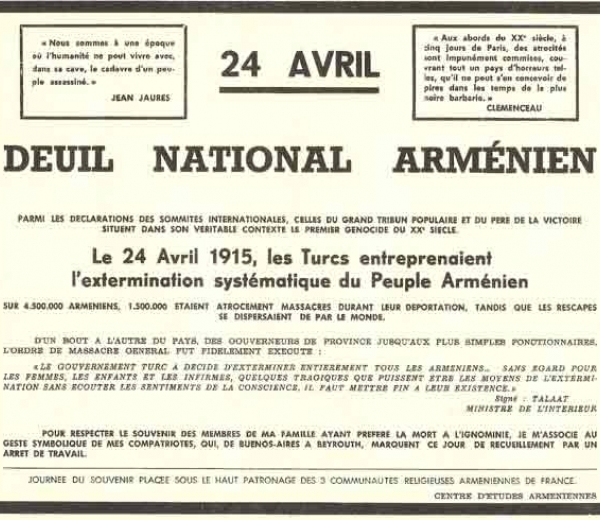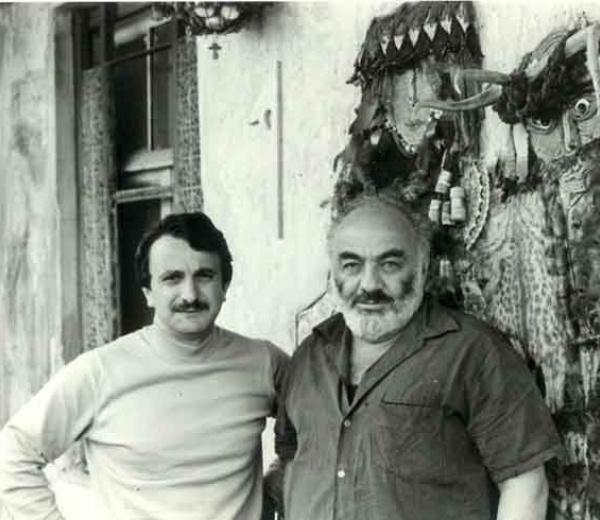Denis Donikian
Submitted by global publisher on Thu, 05/26/2016 - 15:58
English
Intro:
At the age of 73 Denis Donikian, a French-born son of Armenian Genocide survivors, has a rich body of work – as a writer of poetry, essays, novels, short stories and translations and as a visual artist, painter and sculptor. His work, like the diaspora, is guided by fragmentation. As New York art critic Clement Greenberg observed, “Being stateless is seeing inside oneself, splitting into bits and fragments, the impurity of one’s condition.”
Weight:
-7 500
Story elements:
Text:
At the age of 73 Denis Donikian, a French-born son of Armenian Genocide survivors, has a rich body of work – as a writer of poetry, essays, novels, short stories and translations and as a visual artist, painter and sculptor. His work, like the diaspora, is guided by fragmentation. As New York art critic Clement Greenberg observed, “Being stateless is seeing inside oneself, splitting into bits and fragments, the impurity of one’s condition.”
Text:
Donikian’s latest novel, “Vidures” (“Guts”), is a lacerating and bitterly satirical portrayal of a destitute and violent country governed by a corrupt and unpredictable power. While many readers found it shocking, disturbing and distasteful, this expository work in the spirit of Moliere is nonetheless a moving and amusing expression of love for Armenia. The book was shortlisted at the 2013 First Novel Festival in Chambéry, France.
The genocide and its silence
Denis Donabed Donikian was born the youngest of three children on May 19, 1942 in Vienne, a small city just south of Lyon, France. He spent his childhood and adolescence in Vienne, living in Le Kemp, a former armaments factory housing workers who were Genocide survivors. There, his parents spent long evenings with compatriots from their home town of Malatya (present-day eastern Turkey), being careful not to explicitly mention past traumas within earshot of the children.
“They didn’t really talk about the Genocide, only in bits. My parents just used the word ‘aksor’ (exile) or spoke Turkish so we wouldn’t understand. When I was a little boy, I’d fall asleep on my mother’s lap, and it was in that half asleep state, unconsciously, that I absorbed their tales,” Denis remembers. One day, his mother tuned in to a Turkish station, saying, “They hurt us, but I love their music.”
The child began to to get a glimpse of the magnitude of the disaster that had occurred. “My subconscious was formatted by what was not said,” Denis says.
Image:

Text:
|
Le Kemp in Vienne |
Saved by a just man
It’s an odd paradox that the man who wrote “a small encyclopedia” of the Armenian Genocide knows almost nothing of the ordeal his own family endured. He knows that his maternal grandmother, Djohar Tchetakian, saved the cash box of a Kurdish “agha” during a fire at a market, and that in gratitude, he took her under his protection.
If the lives of many Armenians were saved, it was thanks to the courage of Moustapha Agha Aziz Oghlou, mayor of the city.
In 1915, Malatya was an important transiting point for convoys of deportees. The humanist mayor, opposed to deportation orders, took the risk of protecting his city’s Christians and did everything in his power to save Armenian lives. This “just among nations” died in 1921, assassinated by one of his sons for having saved the “giaours,” a pejorative term for non-Muslims.
During the first months of the Genocide, Catholics in the Ottoman Empire benefitted from the protection of Angelo Maria Dolci, vicar apostolic of Constantinople who pleaded the Armenian cause to the German and Austrian ambassadors and to the Turkish authorities themselves. In the hope of being spared, Donikian’s parents converted to Catholicism.
On the roads to exile
Forced by circumstance to marry in 1922, Denis’s mother Takousi and father Iskander left Malatya on the backs of donkeys, along with a paternal aunt, Araxie. They arrived in Aleppo, and were joined there by several members of the maternal family from Malatya. A year later, like many of their compatriots, they left Aleppo for Lebanon. The Land of Cedars was under French control and Armenian refugees were enlisted as manpower for French factories.
Absent when his identity was being established by the Lebanese authorities, Donikian’s father was designated “son of Dono” and thus acquired a new last name, Donikian, instead of his previous one, Kechichian. He was the first to go to France, staying alone for a year before bringing over his wife and her sister. He worked in several cities before opening a butcher shop in Vienne.
In 1924, France closed its doors to Middle East immigration and Donikian’s aunts and uncles remained in Aleppo, leaving for Soviet Armenia during the great wave of repatriation in 1947.
The great separation of 1947
Answering the call of Stalinist propaganda, the illusory return to a fantasized Eden turned into a nightmare. Donikian was only five years old when he stood at the Marseilles port of La Joliette, watching the departure of the ship Rossia carrying 3,600 “shipwrecked of the promised land” – including his best friend Gollo, whom he would never see again.
It was an indelible wound that would feed Donikian’s reflection on the flaws of the Soviet system 20 years later.
First awakenings
It was during the years 1953–1958 in the prestigious Collège des Mekhitaristes in Sèvres that Donikian first attended classes in Armenian history. In that pool of diaspora elites, he wrote his first poem in Armenian, dedicated to his parents. Thanks to his “lycée” professors, he acquired a taste for literature and philosophy, feeling his first deep literary emotions while reading Balzac, Claudel, Valéry and Proust, as well as Montaigne, La Fontaine, Rimbaud, Verlaine and others.
In the 1960s he also discovered the Soviet dissident Alexander Solzhenitsyn. At 21, he apprenticed as a militant, joining the Center for Armenian Studies set up by Dr. Georges Khayiguian, whose authority and charisma fascinated many young Armenians in France. “First of all, he taught us who we were,” says Donikian with emotion.
He and his comrades devoted themselves, body and soul, to what now looks like prehistory in diaspora activism. Together, they published a manifesto for the 50th anniversary of the Genocide.
He remembers having obliged “the Armenian shopkeepers to close shop on April 24, if only between 12 and 2 p.m. We talked to them for a long time, when necessary, to persuade them to lower their blinds.”
Image:

Text:
|
A poster of the Center for Armenian Studies for April 24 |
In 1969 with a degree in modern literature Donikian traveled to Soviet Armenia, officially to study Armenian literature but in fact to write a book about the daily lives of Armenians in that Soviet Republic. The book was “Ethnos.”
Travels and inspiration
Since the end of the 1960s, Denis Donikian has traveled the globe. From 1971 to 1973, he worked as a teacher of English in Kiev, followed by South Vietnam from 1973 to 1975, where he taught at the University of Dalat. There he married, and from that union came three children: Mickael, Samuel and Milena.
Never tiring of traveling, Donikian has been all over Europe and the Mediterranean, to the United States, the Indian Ocean, Turkey, Syria, Lebanon, the Sinai desert and the volcanic island of Stromboli.
But of all these countries, Armenia has been his priority and main source of inspiration for four decades.
As an observer for Transparency International during the 2008 elections, he witnessed the bloody repression of anti-government demonstrations. These experiences permeate his many books, including those published in French: “Le Peuple Haï,” “Un Nôtre Pays,” “Hayoutioun, chronique d’une Arménie virtuelle,” “Vidures” and others.
A humanist first
Engaged but resistant to all forms of nationalism, Donikian has participated actively in Armenian-Turkish dialogue since the early 2000s. Between 2004 and 2008, this former militant of the Center for Armenian Studies was a prime figure on Yevrobatsi.org, a site for discussion and reflection. It was intended, in the context of Turkey’s admission to the European Union, as an Armenian window on the old continent. Together with Michel Atalay, a French man of Turkish origin, Denis instituted a combined Armenian-Turkish commemoration in front of the statue of Father Komitas in Paris, which took place annually from 2007 to 2011.
Praised by some, jeered at by others, Denis Donikian’s language is harsh and his humor corrosive, but his Armenian sensibility stands as an observation point for humanity’s progress. One hundred years after the Genocide, he is fighting for its recognition – and will do so in Turkey, together with other co-signers of a petition who believe in the importance of dialogue with Turkish civil society.
Subtitle:
French writer of Armenian origin and devout humanist
Story number:
17
Author:
Tigrane Yegavian
Header image:

